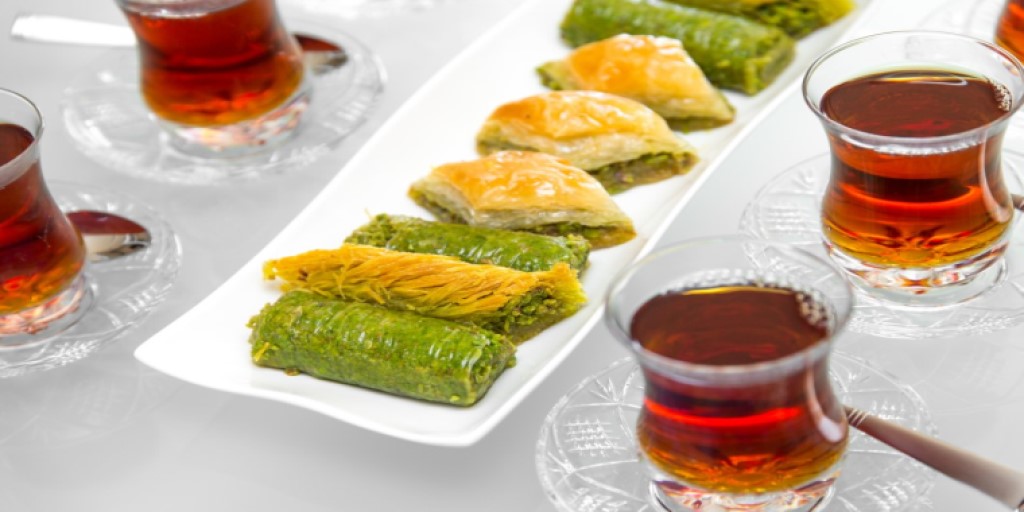Turkish Tea & its Cultural Significance
Never underestimate the cultural significance of Turkish tea. To Turks, it is a shared gift between friends, a welcoming invite to strangers, fuel for the workplace, a handshake between business partners and the perfect start and end to a blessed day.
Every day, across the country, Turks drink thousands of glasses. Starting with at least two cups, alongside a traditional Turkish breakfast, in business and offices, a brew is on the boil for most of the day. For the stay at home mums, afternoons are their time to get together and chat over tea, while men gather in the male dominated tea houses as seen in most villages, towns and cities.
Many people, who are unfamiliar with Turkey assume coffee is the national drink, but it is sweet, black tea served in tulip-shaped glasses. One could almost accuse Turks of being addicts because if for any reason, they stopped selling tea, the country would indeed grind to a halt.

About Turkish Tea : The National Drink of Turkey
People who are unfamiliar with the country of Turkey assume the national drink is coffee, but in fact, tea is the inseparable drink of Turkish culture. Women, family, and friends often meet in tea gardens, while men flock to the male dominated teahouses that are a focal point of most villages and towns.
Harking back to the old days of face to face interaction, indulging in the daily ritual of tea drinking in Turkey means you don’t need phone credit, Facebook Time or otherwise to socialise. It is still a personal experience and in most cases of strangers, the beginning of a beautiful friendship. It even has its own proverb connecting it with love.
How to Drink Turkish Tea
Called Cay in Turkish, small tulip shaped glasses sitting on round saucers are used to drink the tea. Turks never add milk but generally do insist on two cubes of sugar or more. Then it is a simple case of sipping it slowly to flavour the taste.
More than likely, Turkish friends will serve you tea when you visit them in their home. They may also invite you to meet them in tea gardens that are family destinations. Teahouses, generally located in the village or town centre are male-dominated environments, and it would be extremely unusual to see a female in one of those.
How to Make Turkish Tea
Traditionally, a steel, two-tire pot called a caydanlik is used to make Turkish tea. Take the larger bottom pot and boil water in it on the stove. Put 2 tablespoons of tea leaves into the top pot, and fill it with boiling water from the lower one. Sit it on top of the bottom pan for approximately 10 minutes.
When you are ready to serve, fill a small tulip shaped glass either a quarter or a third of the way up, with the tea mixture from the top half of the caydanlik. Top up with clear water from the bottom pot. You can alter this mixture according to your taste of whether you like strong (demli) or weak (açik) tea. Add cubes of sugar to taste, then stir, and drink.
Caykur Rize Tea
The most widely used brand of tea in Turkey is Caykur from the northeast region of Rize. This province, known as the tea capital of the country has a mild climate suiting the green mountainsides covered with tea plantations. As the main trade of the region, estimates say every second adult works in the tea industry of Rize. Caykur produce many variations of tea although Rize Turist is the most widely sold. If you are in that region, visit the Caykur tea gardens for a refreshing brew and fantastic view over the city and its tea plantations.
Other Types of Turkish Tea
Oralet is a fruit tea with flavours such as orange, apple, lemon, and cherry. Rather than using traditional tea leaves, the mixture consistency looks like sprinkles used for decorating cakes. It has an unusual bright colour, a fruity taste and generally thanks to its sweetness, does not need additional sugar. Typically sold at the local weekly markets, this tea type appeals to tourists more than Turks.
“Sevmek Çay Gibidir Sevilmek Seker Bizim Gibi Garibanlar Çayi Sekersiz”
Meaning “To love is like tea, to be loved is like sugar. The poor like us drink their tea without sugar.”
Istanbul & Blacksea tour and Our daily short Turkey tours are perfect for everyone to see the highlights of this vast metropolis